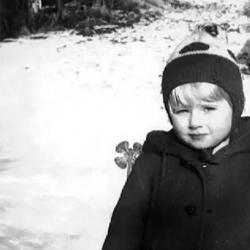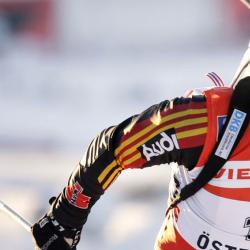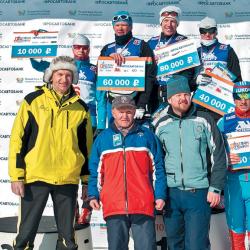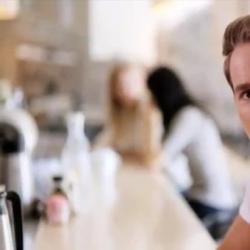Biathlete Poiret personal life. Poiret, Raphael. “The French are afraid of Putin”
He, as we remember, managed to train the Belarusian men's team. Liv-Grethe, also known by her maiden name Shelbride, retired from acting in 2006. Now the Scandinavian woman is already 41, but she is still charming, attractive and very smiling. In Raubichi, the participants of the “Race of Legends” had a program scheduled minute by minute, and it was not so easy to do a detailed interview with any of them. However, Poire kindly gave the PB correspondent a quarter of an hour.
- What emotions did you experience while participating in the “Race of Legends”?
- Oh, this is very fun and funny! The competition itself was an interesting fight, it was exciting. But the main thing is to meet old friends, those with whom we performed together for more than one season in the past and just had a good time.
- In general, do you rarely see them now?
- Yes, almost never. We haven’t met some of them for ten years, since I ended my career. And some left biathlon even earlier, so we didn’t meet each other even longer. For example, Galina Kukleva - I don’t even remember the last time we saw each other. Well, it’s all the more pleasant to chat in Raubichi!
- How did you feel while roller skiing?
- To be honest, I’ve already lost the habit of them. Over the past ten years, I’ve gotten on roller skates three or four times, no more. Maybe that's why my speed left much to be desired. However, this is understandable. Now I no longer have the same body, the same muscles as during the seasons of active performances. However, the body remembers everything. Therefore, we continue to willingly participate in such competitions.
- Are you upset that you didn’t win any of the Raubich races?
- No, what are you talking about? Of course, winning is always nice, but current competitions are more of a show and a meeting with old acquaintances. At the same time, in the super sprint I was close to first place, so I performed well. True, Florence Baverel-Robert turned out to be even faster, so my congratulations to her!
- How do you like the organization and atmosphere of the “Race of Legends”?
- This is something incredible! It's nice to see that so many people came to Raubichi to see us. Very good. Therefore, I would like to say thank you to Daria Domracheva, who invited us to Belarus. Thanks to her, I experienced wonderful emotions.
- Is this your first time in our country?
- Yes, I’ve never come before. I liked Belarus - I feel like there are great people here.
Your ex-husband Raphael Poiret coached the Belarusian men's team several years ago. Did he say anything about his experience?
- Even quite a lot - about racing, conditions for training. I remember Rafael also emphasized that there are many good people in Belarus.
- Why did he leave quickly enough?
“It wasn’t so easy for him to work, if only because of the language barrier.” I had to speak English, which is not Rafael’s native language. Probably, for successful work you need smoother communication, when you have the opportunity to clearly convey your requirements to the athletes.
- Daria Domracheva invited you to the “Race of Legends”. Do you know her well?
- I won’t say very much. However, we can talk when we see each other. This is an outstanding athlete of our time. Today she is the best in the world.
- What makes Dasha so phenomenal?
- Of course, she trains well. But character is even more important. It is clear that Domracheva is a purposeful person who gives her all to complete her tasks. This is very important in our sport. And, of course, excellent technique, excellent physical shape. In short, there is a whole complex of factors that contribute to achieving success. And Dasha, it seems to me, is not arrogant. I don’t know her that well, but that’s the impression I get. I see that she willingly communicates with other athletes, even if she is much stronger than them.
- Due to illness, Daria misses the coming season. Do you think this is the right decision?
- Right now - probably yes. When you have an injury or illness, you need to listen carefully to your body every day. If you feel that it’s better not to perform for a while, then it’s not worth the risk. On the other hand, after some time the situation may change. But now Daria clearly needs time to completely get rid of the disease. At this stage, this is the most important thing for her. Because if you rush and force things, you can subsequently lose many years. I know what I'm talking about - I myself suffered from injuries and illnesses.
- Who do you consider the favorite of the upcoming season in the absence of Domracheva?
- Don't know. Much will depend on Kaisa Mäkäräinen's shooting. As we know, she runs very fast, all that remains is to hit targets just as consistently. However, there are other girls. You know, it’s generally difficult to predict: the new season will be a new challenge for many athletes.
- Do you regularly watch races on TV?
- Yes, it still makes me happy. I watch almost all major competitions. To some extent, this has become a profession - I work for the Norwegian TV channel NRK as a biathlon expert. I go to some races myself.
- Is this your main occupation now?
- More like seasonal work. After all, races only take place in winter. In general, I have a hotel that I bought several years ago. It is located in the town where I grew up and still live. Managing it takes a lot of time.
- Do you miss the times when you took part in races?
- Certainly. But time passes - I am no longer twenty years old. This is a natural process, it has to end at some point. And I was so lucky - I was able to perform for many seasons. And she ended her career at the optimal moment. The time has come for younger biathletes.
- But Ole Einar Bjoerndalen is your age, and is still in service...
- Ha ha! Indeed, he is in no hurry to retire. But I’m not Bjoerndalen!
- Do you understand his motivation?
- The man has won everything possible. However, biathlon is his life. Since he still likes it, I treat it with great respect. And for me, sixteen years of career is more than enough. I probably could have stayed in racing for another one or two seasons. True, already at that time the eldest daughter Emma was born, it was necessary to pay more attention to her. At first I even took her to races, but it was hard, the child was often sick. Therefore, at 32, I told myself: stop, enough is enough. And she ended her career.
- Was it difficult to adjust to normal life?
- In the first year, on the contrary, I felt relief. No pressure, no training, everything is calm and measured. I took care of my family. But in the second and third years everything changed. There was a feeling that something was missing. Races, competitions, this whole exciting process. But what can you do? Over time, I got used to living in a new rhythm.
- Do you regret anything in your career? Perhaps about the fact that you never managed to win Olympic gold?..
- There is nothing to regret. I tried my best. Yes, she didn’t win the Olympics, but she became world champion eight times. And in general I had a lot of great races.
- Which of them is the most memorable?
- Most often I remember the World Championships, which took place in Oslo. This is an important moment in your career. In general, there were so many competitions and it was difficult to single out something.
- What else do you associate Belarusian biathlon with, besides Domracheva?
- Oh, you now have a good women’s team, strong and progressing girls. I think they will have a good chance in the relay in the new season. If they improve a little compared to last season, then I suppose we will often see them on the podium. There are guys who are also growing. In biathlon it is important to progress steadily - year after year. You train not just for one season, but for many.
- You and Raphael Poiret have three daughters. With such genes, do they have a direct path to biathlon?
- I don’t put pressure on them in any way. Let the girls make their own decisions. If they want, for God’s sake, I will only support their choice. All three are trying to do biathlon. One also plays football. But what happens next depends on them. Will they go into sports or learn another profession? In life, a person must determine his own path. I'm glad that my daughters are doing well. Rafael and I were unable to save our family, but the main thing is that the children feel comfortable. By the way, my ex-husband stayed in Norway and settled very close to me, so we still see each other regularly. We don’t live together, but we have maintained good relations - one might say, even friendly ones. We are connected by many things - not only biathlon.
- Is it true that you were fond of football as a child?
- Ha, your information is correct - until the age of fifteen I played constantly.
- Could you become a professional?
- Hardly. In football I felt best without the ball! I knew how to run well even then, but my technique was lame and my handling of the ball was not so good. In general, I grew up as a sports girl. I also went kayaking...
- What did you like more in biathlon - skiing or shooting?
- It's hard to choose. It seems like there is only one sport, but these activities are so different from each other... Perhaps, I still preferred to shoot. When you close the target, it’s such a pleasure! A unique feeling.
Daria Domracheva at one time shot at someone else’s target, confused “stance” with “prone”... Has anything like this happened to you?
“I also somehow managed to shoot at the wrong target!” It’s funny, of course, but this happens in biathlon. Sometimes you concentrate too much - probably due to excessive tension, such incidents occur.
One of the most titled French biathletes, four-time World Cup winner, eight-time world champion, three-time Olympic medalist. He ended his sports career in 2007, but in 2008 he took part in the World Military Ski Championships, where he became fifth in the company of professional skiers active at that time. On May 15, 2012, he headed the men's biathlon team of Belarus (contract valid until the end of the 2014 Olympics in Sochi).
Personal data
Height: 173 cm
Zodiac sign: Leo
Languages: French, English, Norwegian, Italian
Education: Bachelor
First participation in the World Cup: Lahti (Finland) in 1995
Career
At the 2002 Winter Olympics in Salt Lake City, Poiret won a silver medal in pursuit. He also won a bronze medal as part of the French relay team.
At the 2006 Winter Olympics in Turin, Poiret won a bronze medal as part of the French relay team.
At the 2004 World Championships in Oberhof, Germany, Poiret won three gold, one silver and one bronze medal (in the relay). Together with his wife, Norwegian Liv-Grete Poiret, who won four gold medals, the couple won seven of the ten gold medals awarded at the championship.
In total, from 2000 to 2007, Raphael Poiret won the title of world champion eight times in different disciplines.
Since May 2000, he has been married to Norwegian biathlete Liv-Greta Shelbraith. Raphael and Liv-Grete have three daughters:
In his free time, Raf, as his friends call him, is interested in cinema and loves playing tennis. The athlete is distinguished by sociability, a good sense of humor, and loves and knows how to play to the public.
Sports success
2000: “gold” in the mass start, victory in the overall World Cup standings
2002: Olympic silver in the 12.5 km pursuit, victory in the overall World Cup
2003: bronze in the mass start, fourth in the overall World Cup standings
2004: “gold” in the sprint and individual race, “silver” in the pursuit
New job, beloved woman, new joys... Now only one thing is missing in the life of Raphael Poiret.
– This is where we first met.
Armed with Anne Thunes, Raphael heads towards Festplassen in Bergen. He is dressed in a light, lightweight sweater, with stubble on his face and a scar on his neck that resembles a scorpion’s tail. He points to the Contra bar.
“That evening we spent a lot of time talking and discovered that we had a lot in common.
Anna nods:
“Rafael is not what I thought he was before.” My impression from the TV screen was that he was stern and serious, but now his energy is in full swing and he is full of crazy ideas.
Least Expected
Almost two years have passed since they met, when they both had just ended their previous relationships. They stop at an intersection and see the sun's rays piercing the heavy clouds over Bergen. Rafael looks at Anne in a way that only the French do.
– I met Anne when I least expected it. And exactly when I needed it.
Eight years ago, he retired as a biathlete after 44 World Cup victories and 19 World Championship and Olympic medals. Then he had to go through several dramatic events.
In 2009, he came close to being paralyzed after an ATV accident. He went through a 12-hour operation, and the doctors said it was a miracle that everything turned out okay.
In 2013, he found his father - 34 years have passed since the day his father left Rafael at the age of 4. In the same year, there was a break with his wife Liv-Grethe Poiret, from whose marriage he has three children - Emma (12), Anna (8) and Lena (6). He went from the sheltered environment of a sporting environment to a challenging life in the real world.
– A lot has happened in recent years, and it has not been easy or simple. But I managed to cope with the stress and learned a lot. “I got to know myself better and found peace,” he says.
Childhood without a father
The accident was forgotten; he was most happy that the then two-year-old Anna, who was sitting in the back, was not injured. The divorce from Liv-Grete was not easy, but they work well together when it comes to the children. And the father who left home in Rive, in the south of France, and never returned?
“I felt like I was missing something because I grew up without a father.” It made me a good biathlete because I had to fight every day. Life was a constant battle.
In a series of NRK programs, he learned his father's story, learned that he was wanted and fled to New Zealand, where he married twice before dying in 2011. In the TV program, Rafael met with his father's wives, friends and acquaintances.
“It was good to know the truth about him.” I got answers to questions I've been asking myself for 34 years.
He takes a piece of sandwich from his plate. We are sitting in a cafe in the city center.
– I am a very open and sensitive person. Since the release of the program about my father, I have met so many people who share their problems and want to talk about it. It makes an impression.
– Have you considered the option of returning home to France?
- No never. I have good friends in Norway, I like the local culture, my children are Norwegian. On paper they are half French, but I think of them as Norwegian. And now I met Anne. So no, I never thought about returning to France.
Happening
For nine months he sat at home. Without work, without prospects for the future. A newly divorced and world-weary biathlon coach. The two-year contract with the Belarusian national team was terminated after the first year of work.
– I wanted new challenges, to plunge into a new environment. And I needed more time with the children, I wanted to become a real father.
The challenge he was looking for came into his life by chance, but at the right time: Aker Solutions offered him a job in the North Sea as a laborer. And now he's laying cables and doing repairs here and there, participating in a project that will last until February 2016.
“Luck smiled on me, I was in the right place at the right time. This is a full-time job from 7 am to 7 pm, 12 hours of hard work. But this is a unique environment. I have never had to be in such working conditions, I feel very comfortable. But…
He smiles.
– I remember the first day. It was November, pitch black, and I was sitting in a helicopter on the way to an oil platform. Spotlights, all sorts of equipment, crazy noise. Then I thought, “What have I done?”
Two weeks in four
Outside of work, he plays bandy, squash and goes to the gym. He works in shifts - two weeks every four.
– When I am free, the children live with me for 15 days. The rest of the time I want to spend with Anne. We don't get to be together that often, but we talk a lot on the phone. Not a day goes by without a conversation or text message.
“Yes, we are real teenagers,” Anne laughs, and then speaks seriously.
– Rafael is very kind and takes good care of me.
They both have three children, two of whom celebrate their birthdays on August 9 - his eldest daughter and her eldest daughter were born on the same day.
– We also have many similar memories from childhood. Anne also grew up without a father. And we are both Leos, impulsive and sensitive. And we have the same sense of humor,” says Rafael.
They are laughing. Then, without saying a word, Anna shows the sparkling diamond ring on her finger.
-Are you going to get married?
They nod. They look at each other.
“We are engaged, but have not yet decided on a date,” says Anne.
“It was important to propose to show Anna that I have serious intentions,” says Rafael.
– We have many children, and we bought a ski cottage in Myrkdalen. Over the past two years I have been able to become myself... Finally.
– Do the children get along with each other?
– Yes, we have already gone to Myrkdalen several times - there is enough room for everyone. We will be one big family,” says Anne.
Enjoying walks
Trips to Myrkdalen show that Rafael and Anne still do not agree on everything. She prefers slalom, she doesn't like classic ski racing.
“She hates it when things don’t work out for her,” says Rafael.
“It’s an easy walk for you to overtake me on skis,” says Anne.
- No, I no longer have a competitive spirit. When I go skiing now, alone or not, I just enjoy it. I can ride my bike just to see nature and not have to look at my watch. It is wonderful.
From the first day it was clear for Rafael: he did not want to hide the relationship.
– We are very... “naturell”. I kept saying that I don’t want to hide the fact that we are together. Hiding behind dark glasses on the street is not for me.
– For me, anonymity was a little more important, but now everything is fine. We are no longer 18 years old, but 40,” says Anne.
Life is good
40 is a magic number. Last year, Raphael celebrated his 40th birthday in a grand manner in Bergen. This summer it's Anna's turn to celebrate her anniversary in Bordeaux, with a visit to a winery and a party with a few good friends.
“Right now we only need one thing,” says Rafael.
– Since childhood, I have moved a lot from place to place. He was constantly on the road as a biathlete, then got divorced. Now I want to find a place where I will feel comfortable and calm. I still live in Holansdalen, but Anne and I have a common project - to find a place in Bergen. Soon.
Mountains rise on the horizon, two birds land on the square like two tiny airplanes. Rafael and Anna stand under a blossoming cherry tree, hugging each other.

She needs to get back to work, he's going to town.
- When you come home, cook me dinner. Pleeease,” Rafael says, kissing Anna goodbye.
He watches her go and then returns to the intersection to continue on.
- Life is good now. “I often repeat that I’m unlucky in the game, but lucky in life,” says Rafael.
In Le Grand Bornand he has the status of guest of honor. After the end of the competition, he dined at the press buffet in the company of his new wife, and preferred beer over wine among drinks. For the “Championship” special correspondent, this came as a big surprise, so we started this conversation with such an unusual topic, but then switched to more pressing ones. The great champion was very frank and emotional, like a true Frenchman.
"Chablis is my favorite wine"
- It’s strange to see a Frenchman drinking beer when there is a choice of excellent French wine. Why do you have such atypical taste?
- Today I just decided to try it. I usually drink wine and prefer white. When I was an athlete, I didn’t drink at all, and then I got used to white wine.
- Why white and not red?
- We tried different wines. But dry white wine is more suitable for me, as is my wife. Our favorite variety is Chablis.
I don't know how many athletes were actually involved in the doping system. But it seems to me that this was part of state policy.
- 20 years ago, when your biathlete career was just beginning, could you have imagined that France would soon experience such a boom in biathlon?
- I dreamed about this. When my career began, the Olympic Games were held in Albertville in France. Our women's biathlon team won the relay competition. Then I realized that biathlon could become a much more popular sport in our country, but this requires the support of national television. But then year after year the situation improved. When I finished performing, biathlon went on national television, such as L'Equipe TV, and then we got Martin, and everything started spinning.
- Initially, biathlon in France was an army sport and not a professional sport?
- You're right. I myself was an employee of the French army and received my salary not as an athlete, but as a military man.
-What was your rank?
- Staff Sergeant. I know that by Russian standards this is nothing, but for France this is a very decent title.
“In my time there was no Instagram and I couldn’t promote myself like Fourcade”
-Are you jealous of Martin Fourcade?
- No. He really is better than me. He is more stable in his skiing and has a more efficient technique. In shooting we are approximately equal. I may have shot faster, but he was more stable in contact combat.
- How did he achieve such wild popularity in the country?
- This is all the result of social media. In my time there was no Facebook and Instagram, and Marten pays a lot of attention to social networks.
"Bored to the point of nausea." How Fourcade is killing biathlon
Russians, Germans and Norwegians in Hochfilzen will cheer against Fourcade, because he is killing biathlon with his delusions of grandeur. And everyone is tired of it.
- Which of the other French sports stars can he be compared to in terms of popularity?
- For example, with the legendary judoka Teddy Riner. He, like Martin, has been the best for many years and wins all competitions. Marten is a professional in everything: how he presents himself in the media, how he approaches training, how he communicates with people.
- In one of your old interviews, I read that the middle midfielder of Saint-Etienne was more popular in France than you at the peak of your fame. This is true?
- So it was. The only thing that added to my popularity was when my ex-wife and I won almost all the gold medals at the 2004 World Championships. Then they finally began to recognize me. But to be famous, it is not enough just to win in sports. You need to create your own story and your own image.
Marten is a professional in everything: how he presents himself in the media, how he approaches training, how he communicates with people.
- What is your relationship with Liv-Grete now? How often do you communicate with your children?
- I live 200 meters from my ex-wife, so I spend 50 percent of the time with the children, and she spends 50 percent. That’s why my ex-wife and I see each other all the time and communicate normally.
- Can you compare the atmosphere at biathlon at the iconic German stages and here?
- Of course, the Germans and I have a different mentality. In Germany, the audience is also more international. There are many more Norwegians and Russians there, but here 90 percent of the audience is French.
- But there are Russians here too?
- Yes, of course, but there have never been so many French people at biathlon before. This is cool.
“An athlete could not go against the system. And it's sad"
- Why do you think that Martin Fourcade is cooler than Bjoerndalen in his best years?
- These are different athletes. Ole is Norwegian and was born to ski, so in his prime he was a better skier, but Marten is a true all-round soldier who can shoot and ski well. He is definitely the perfect biathlete and the best biathlete of all time because he can do everything. But I don’t think he will be running even at 43 years old.
- Will he run out of motivation soon?
- You can always find motivation, but what about your family? He has two children, I have three, and I know what it is. And Bjoerndalen only recently had his first child. When you have a family, you can’t live by biathlon all the time.
- You worked as a coach in Belarus for several years. Belarusians and Russians have a common mentality. How do you see it?
- I still have a good friend in Belarus, with whom we maintain good relations, but the system there is really different than in Norway or France. For Russian people it is very difficult to change anything in life. They just don't want it. They are afraid to change the training system, to change consciousness. This takes time, a new generation of athletes needs to grow up, but they want nothing to change and at the same time, there should be immediate results. It doesn't happen that way. I tried to change something in Belarus, but they didn’t want to wait. They wanted to be the best tomorrow.
- How do you see the current situation in Russian sports? I mean all these doping scandals and investigations.
- I don’t know how many athletes were actually involved in the doping system. But it seems to me that this was part of state policy. It was not so easy for an athlete to make a choice whether to go against the system or submit to it. It is very sad.
I understand how difficult it will be for your athletes to compete without their flag and anthem, but sports should not suffer from this. Therefore, the leadership of your country did the right thing, which gave the athletes the opportunity to perform.
- In Russia it is generally accepted that this is part of the new Cold War.
- The Cold War between America and Russia is indeed returning, but Russia’s problems with doping have nothing to do with it. McLaren's investigations prove this. We are talking about sports, not politics.
“The French are afraid of Putin”
- In your opinion, the athletes might not know about the system you are talking about?
- Certainly. Therefore, I am against excluding Russia from sports, be it biathlon or some other sport. We need Russia. In addition, I understand that these are different things when athletes were forced to take doping and when they did it voluntarily.
- Do you think the IOC made a fair decision?
- Certainly. It was difficult to do. And I understand how difficult it will be for your athletes to compete without their flag and anthem, but sports competitions should not suffer from this. Therefore, the leadership of your country did the right thing, which gave the athletes the opportunity to perform.

The IOC's decision is unfair, but we will go. To spite the enemies! How it was
The Olympic meeting of athletes decided that they need to go to the 2018 Games even without the flag and anthem. It was difficult, but they did it.
- What do ordinary people in France think about Putin?
- They are afraid of him. There are several people in the world, such as the head of North Korea, the presidents of America and Russia, who are feared by people around the world. Who knows what these dangerous people might do?
- You worked as a coach, a television journalist, and a worker at an oil station. What do you plan to do in the future and what experience did you enjoy the most?
- I liked everything I did in life, but the best years were when I was an athlete. But now biathlon is not so important in my life. I try to spend time with my wife, children and friends. It is important for me to be close to loved ones, and biathlon does not provide such an opportunity.
Rafael started biathlon at the age of 20, in 1994. His younger brother Gael is also a biathlete, although he is still far from his older brother's laurels.
Raphael Poiret made his debut in the World Cup in the 1995/96 season and took 17th place, which was a good result for a young athlete. A year later, he already declared himself loudly, entering the top five biathletes at the end of the season. True, the talented athlete in those years was characterized by instability of results, as a result of which he could not win awards at world championships and the Olympic Games. While his peer Ole Einar Bjoerndalen won the Olympics and World Cup in 1998, Rafael, who had decent speed on the ski track, was let down by inaccurate shooting. In the future, the confrontation between these two athletes will become central in men's biathlon for many years.
The turning point in Poiret's career was training in shooting under the guidance of Jean-Pierre Amadt. The result of hard work was the first World Cup in the 1999/2000 season. In 2001, a French army soldier repeated his success, adding to the Big Crystal Globe a gold medal at the World Championships in Holmenkolen. In 2002, Rafael won the third cup in a row, once again leaving behind his main rival, Bjoerndalen.
In addition to sporting victories, success accompanied the Frenchman on the personal front. At the end of the 2000/01 season, he married his long-time lover and colleague, Norwegian Liv Gret Shelbride.
The only thing Rafael lacks is Olympic gold. At the 2002 Winter Olympics in Salt Lake City, Poiret won a silver medal in pursuit. He also won a bronze medal as part of the French relay team.
The 2002/03 season was the most unsuccessful for Poiret. The birth of his daughter Emma did not allow him to fully concentrate on competitions and led to the loss of the positions he had gained.
However, in 2004, Rafael again proved that he is an outstanding athlete. At the World Championships in Oberhof, Germany, Poiret won three gold, one silver and one bronze medal (in the relay). Together with his wife, Norwegian Liv-Grete Poiret, who won four gold medals, the couple won seven of the ten gold medals up for grabs at the championships. Rafael won almost all the races at the end of the season and won the Large Crystal Globe and Small Globes for victory in each biathlon discipline. Perhaps the return of his wife to the ski track helped the athlete regain his former incentives to win.
The 2004-2005 season was not easy for Rafael, but he won three victories and entered the top three at the end of the season.
At the Olympic Games in Turin, Rafael was unable to achieve his main goal - gold, but limited himself to bronze in the relay race.
Raphael Poiret retired during the 2006/2007 season. His last race was a stunning mass start in Holmenkollen, where he lost to his main rival Ole Einar Bjoerndalen by 3 centimeters. In his last season, Raf was absolutely brilliant, especially in the second half. He was a potential World Cup winner, but did not go to the last stage in Khanty-Mansiysk.
In total, from 2007 to 2007, Raphael Poiret won the title of world champion eight times in different disciplines.






